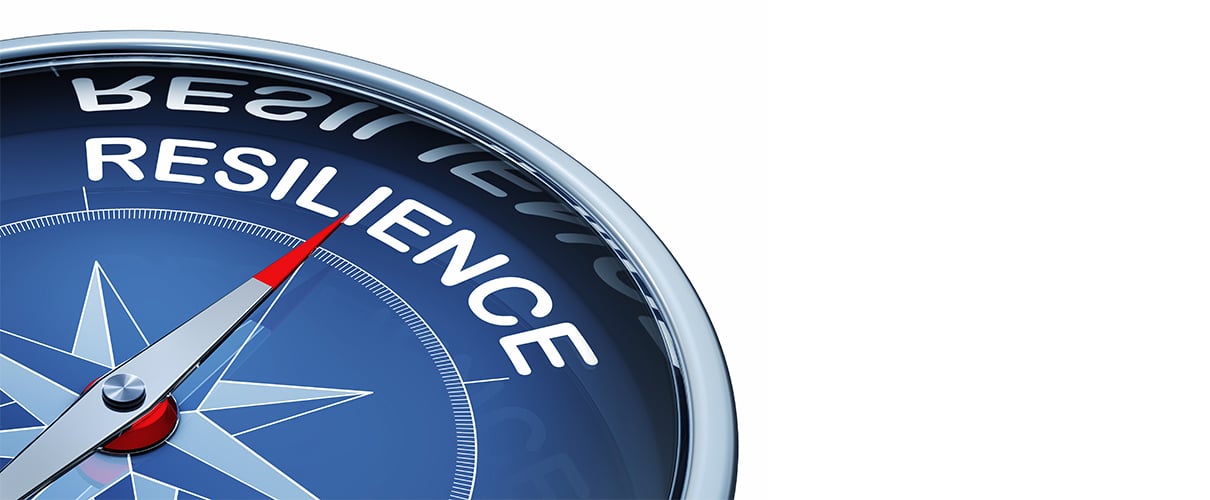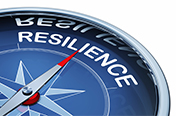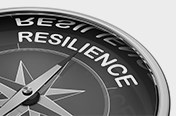Let’s Be Resilient!

Resiliency: It's What You Think and What You Do
If you are a runner you know what resiliency feels like. It is the "second wind" you get after running for some time and wondering if you will ever reach your destination. That burst of energy propels you forward even though your body demands that you give up. Runners, regardless of their individual abilities, point to this feeling as one of the reasons they finish the race.
Resiliency is a mindsetIt is the determination to keep going even though it is difficult to do so. Resiliency looks toward the future and determines our behavior in the present. Carl Jung was a 20th-century psychiatrist who described resiliency this way: |
|
Resiliency is also a set of behaviors and skills
These behaviors and skills allow people to bend, but not break when experiencing adversity, stressful situations, or even trauma. Individuals can learn these skills throughout their lives and apply them as they encounter tough times.
At SPC, our concept of resiliency looks like this
We’ve been researching and working on the resiliency of SPC students since 2017 and have developed the following concept of resiliency based on what we’re discovering in our students.
Individual Skills
Embodiment
This is the ability to feel safe, comfortable, and confident in your skin. It includes being able to name and freely talk about how your body feels at any given moment, how to notice when your body feels stress, and how to care for your body in order to feel healthy and balanced.
Executive skills
These include emotional intelligence--the ability to name emotions that you and others are feeling as you are feeling them--as well as life skills like time management, prioritizing, setting goals, and making plans and adapting them based on outcomes.
Spirit
This includes a positive outlook, hopefulness, mindfulness, confidence, creativity, celebration, reflection, and restorative practices.
Social Skills
Resiliency is when you use these three areas of skills to take action with others. For example, you might be struggling in a class, so you rearrange your time to study for 30 minutes each day and you also schedule a tutoring session with your instructor.
In other words, resiliency is not just something you do by yourself. Resiliency is helping other people when they are struggling or reaching out for help when you are struggling.
Resiliency Skills
A skill is the ability to do something well. How well do you incorporate the following actions and beliefs into your life? These skills are not in a particular order; they are all important. This list has been adapted from The Road to Resilience.
Building up resiliency skills
Believing that things can change for the better will allow you to focus on what you can do to turn a negative situation into a positive one.
Struggling? Try this:
Talk to a counselor, speak affirmations, avoid negative people/media, practice silence, meditation, or prayer
People with healthy self-esteem are able to describe their strengths and weaknesses without shame. They also believe they deserve the respect of others.
Struggling? Try this:
Ask others what your strengths are, look at your challenges as things that make you unique, be kind to yourself.
Building Confidence and Self-Esteem
How to Improve Your Self-Esteem: 12 Powerful Tips
Life is full of changes. Expecting that things can and will change can allow you to embrace changes as they come.
Struggling? Try this:
Consider what you can control in a situation, try looking beyond the current problem and look toward the future, notice that you may feel better now than you did in the past.
How to Handle Changes in Your Life
5 Keys to Accepting What You Can't Change
Realize you can control how you react to adverse situations. Consider what you can do to improve the situation and make realistic goals that get you closer to what you desire.
Struggling? Try this:
Think about how your actions can affect the result you want to achieve, make realistic and time-specific goals, celebrate every accomplishment
Do an activity you enjoy or helps you feel like you accomplished a goal. Exercise, hang out with friends, and have some fun. These activities help prepare your mind and body to manage stress in a healthy way.
Struggling? Try this:
Try a new activity, revisit old hobbies, exercise regularly, eat well, get some rest, do nothing, talk to a friend, read or watch uplighting posts, articles or videos.
The Benefits of Play for Adults
10 Simple Ways to Practice Self-Care
Tragedy and tough times can often cause us to appreciate life, our relationships, and the things around us in a new way. Adverse circumstances can also reveal a new skill or ability we did not realize we had before.
Struggling? Try this:
Think back on a tough time in from your past and consider what you learned about yourself or about life from that situation, take time to appreciate the small things in life.
Don't Forget the Past. Learn from It.
3 Tips to Appreciate Life More
Advising, teaching, and assisting others through a challenging activity can boost your confidence and help you realize that something good can come from your past struggles.
Struggling? Try this:
Be open to opportunities to help someone learn something you already know, serve as a volunteer or a tutor
7 Scientific Benefits of Helping Others
Discover Local Volunteering Opportunities
Requesting help from trustworthy individuals can help you access resources, broaden your options, and lean on others for support during tough situations.
Struggling? Try this:
Build trust with others, ask an expert for advice, talk to people who know about resources, research the problem
How do I Build Mutual Trust in a Relationship?
How to Ask for Help and Why It's Awesome?










